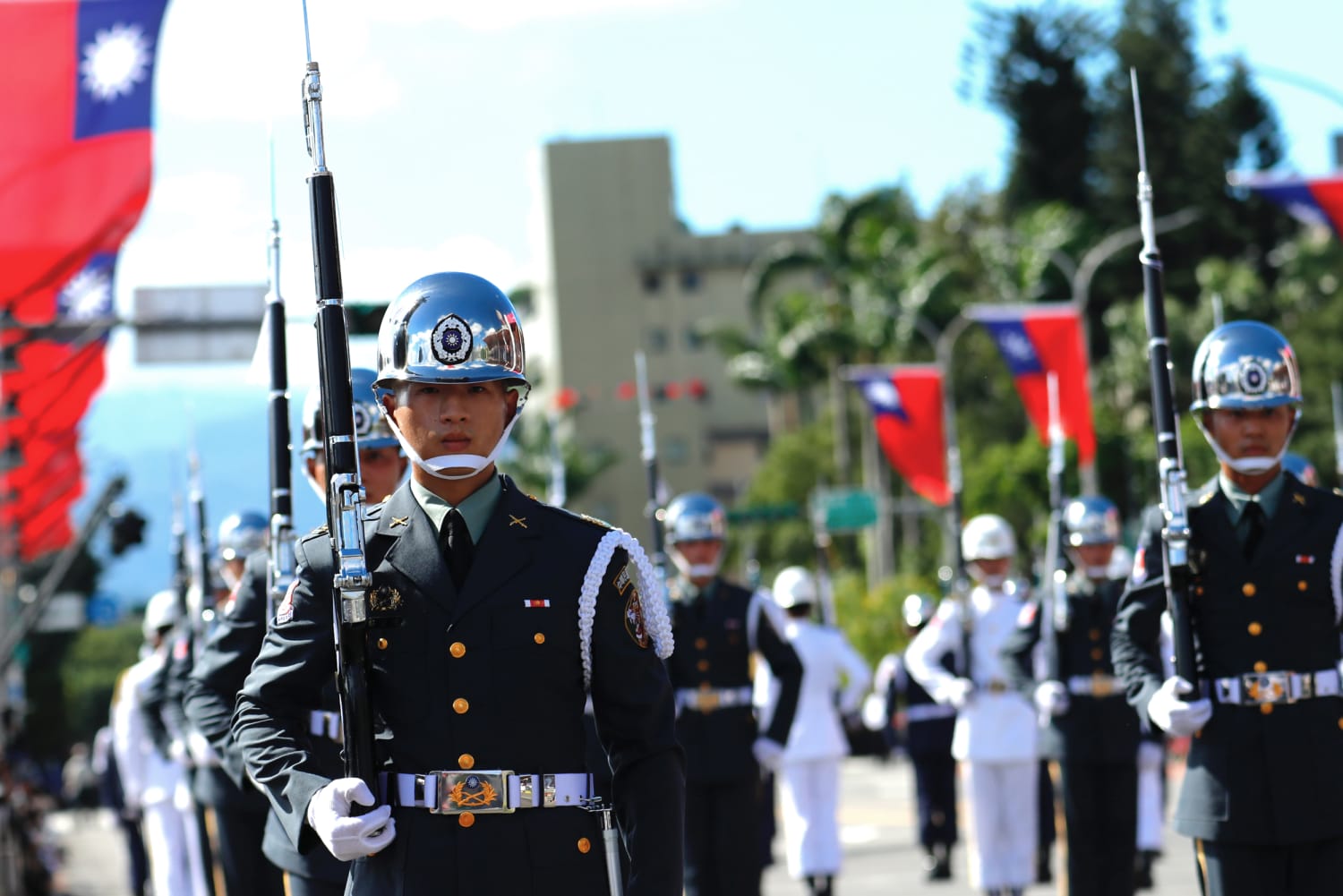
HONG KONG — It was Day 7 of the freediving world championship, streamed live online from Cyprus. One by one, women competing in the constant weight category used bifins or monofins to dive to a targeted depth and back to the surface, all in a single breath. Onscreen next to each diver’s name was her nationality and national flag.
But as Mia Hou of Taiwan took her turn, the red, white and blue Taiwanese flag — which had appeared earlier in the livestream — had disappeared. Organizers had removed the flag without warning after authorities in China, which claims the self-ruling island of Taiwan as its territory, stopped the livestream on platforms in the mainland.
The diving association representing Taiwan protested the decision, but was told the flag could not be restored in accordance with International Olympic Committee rules. In the following days, athletes from 10 countries, including the United States, asked that their flags be removed as well, arguing that sports should be politically neutral.
The International Association for the Development of Apnea, which held the event last month, later apologized to Taiwan, saying “the stop of the stream by the Chinese authorities took us by surprise and the team was not prepared to deal with it on such short notice.”
The freediving incident is part of China’s intensifying international pressure campaign over Taiwan, and an indication of Beijing’s growing assertiveness about its claims over the island off its eastern coast. It comes as tensions between China and Taiwan ratchet up, with Beijing sending scores of warplanes toward the island, and Taiwanese officials trying to consolidate international support. While experts say outright war is still unlikely for now, it is clear that the conflict between the two sides goes beyond military posturing, and is making itself felt far from the Taiwan Strait, drawing in countries and organizations around the world.
The dispute goes back to 1949, when Mao Zedong’s Communist Party won China’s civil war and established the People’s Republic of China. The defeated Nationalists fled to Taiwan, officially known as the Republic of China, and claimed they were the only legitimate Chinese government.
“What has shifted in recent years is the fact that finally Beijing has sufficient capabilities to act upon its threat.”
Most countries today, including the U.S., have full diplomatic ties with China rather than Taiwan, and do not recognize Taiwan as a sovereign state. But the island, now a democracy, fiercely opposes the “reunification” with China that its leader, Xi Jinping, insists will be achieved, peacefully or not. And while China pressures Taiwan in various ways, the military strides it has made in recent years put it in a stronger position than ever.
“Beijing has been threatening war against Taiwan for decades,” said J. Michael Cole, a senior fellow with the Global Taiwan Institute who is based in Taipei, the Taiwanese capital. “What has shifted in recent years is the fact that finally Beijing has sufficient capabilities to act upon its threat.”
China has long sent warplanes near Taiwan, home to 23.5 million people about 100 miles from the Chinese mainland, to exhaust the island’s air force, test its defenses or otherwise express its displeasure with developments in Taiwan or elsewhere. But the number of military sorties jumped starting last year, buzzing Taiwan’s self-declared buffer zone almost daily without actually entering its airspace.
Chinese military activity further escalated over a four-day period in early October that coincided with the country’s National Day, with a total of 149 Chinese warplanes appearing in the skies near Taiwan, compared with 380 in all of 2020. The U.S. criticized China’s actions as “destabilizing,” while China said Taiwan was an internal matter and its incursions were necessary to protect national sovereignty.
“The Taiwan question arose out of the weakness and chaos of our nation, and it will be resolved as national rejuvenation becomes a reality,” Xi said in a speech this month.
Taiwan Defense Minister Chiu Kuo-cheng told lawmakers this month that military tensions with China were the worst in more than four decades, and that China would be able to mount a full-scale invasion by 2025.
Experts say China’s recent military maneuvers may be aimed less at Taiwan than at the broader international community, which has been showing more robust support for the island.
“Beijing is trying to impress upon everyone that they are not going to get pushed around, that they are not going to tolerate Taiwan moving farther away,” said Shelley Rigger, a political science professor at Davidson College in North Carolina and the author of “Why Taiwan Matters.”
Taiwan President Tsai Ing-wen has described the island as being on the front lines of a global ideological battle, writing in Foreign Affairs this month that “if Taiwan were to fall, the consequences would be catastrophic for regional peace and the democratic alliance system.” At Washington’s urging, she has pushed to increase defense spending and modernize the Taiwanese military, the results of which were on display this month at a military parade for Taiwan’s National Day that included homegrown missiles.
Rigger said Tsai, who some feared Beijing would find too provocative when she took office in 2016, had been a prudent leader.
“Her message all along has been, ‘We are not going to give Beijing a pretext for military action, but we are also not surrendering by any means,’” Rigger said.
What is more troubling for Beijing, Rigger said, is the unpredictability of Washington, under not only the Trump administration but President Joe Biden as well. At a news conference last week, Foreign Ministry spokesman Zhao Lijian said the U.S. was “stoking geopolitical confrontation” by selling Taiwan arms, landing U.S. military aircraft on the island and sending warships through the Taiwan Strait.
“The U.S. is a troublemaker, a saboteur of regional peace and stability, and a spoiler of solidarity and cooperation,” Zhao said.
Biden has made no change to basic policy: While the U.S. sells defensive weapons to Taiwan and maintains unofficial ties, it does not support Taiwanese independence and has never explicitly committed to defending Taiwan against Chinese invasion. But he has followed former President Donald Trump in deepening ties with the island, including reviving trade talks, enhancing cooperation with the Taiwanese coast guard and easing limits on contacts between U.S. and Taiwan government officials.
At the same time, the U.S. and China have continued to spar over issues including Hong Kong, Xinjiang, human rights, cybersecurity and trade, with diplomats from the two countries having a public spat during talks in Alaska in March. Though there are signs of a thaw in relations, including a virtual summit between Biden and Xi expected before the end of the year, that progress could be undermined by disagreement over Taiwan.
China’s military activity near the island “is destabilizing, it risks miscalculation, and it has the potential to undermine regional peace and stability,” Secretary of State Antony Blinken said at a news conference this month.
The Biden administration’s support for Taiwan appears to be backed by growing numbers of Americans.
According to poll results released in August by the Chicago Council on Global Affairs, a majority of Americans believe that the U.S. should recognize Taiwan as an independent country and, for the first time, that the U.S. should send troops to defend Taiwan if China were to invade. Lawmakers from both parties have also said the U.S. should end its policy of “strategic ambiguity” and commit to Taiwan’s defense, though others argue that could backfire.
Shifting American attitudes toward Taiwan are motivated partly by cooling attitudes toward China, the council said, a trend that is echoed in advanced economies around the world.
Amid America’s hardening attitude toward China, Beijing is also making clear that it is willing to exert influence far beyond its borders. Taiwan accused China of obstructing it from buying coronavirus vaccines internationally, and China has continued to block Taiwan from participating in the World Health Assembly even during the pandemic.
In August, China recalled its ambassador to Lithuania and expelled the Lithuanian envoy to Beijing over plans for Taiwan to set up an unofficial embassy in Vilnius, the Lithuanian capital, called the “Taiwanese Representative Office” rather than the less provocative “Taipei.”
Taking issue with the way countries and organizations refer to Taiwan is a key way China tries to isolate the island, said Tiffany Ma, a senior director at BowerGroupAsia. In recent years, global airlines and hotel chains have altered their websites at Beijing’s request to avoid any suggestion that Taiwan is not part of China, lest they lose access to the lucrative Chinese market.
Ma also pointed to Chinese demands at the U.N. that nongovernmental organizations seeking consultative status change the way they refer to Taiwan on their websites, including the World Bicycle Industry Association, the American Sociological Association and a Jewish group in New Jersey.
“At this point we see that nothing is really too small for China,” she said.
The backlash China is experiencing on the international stage presents real opportunities for Taiwan but also real dangers, Rigger said.
“If you overplay your hand then you may find yourself facing the wrath of the P.L.A.,” she said, referring to China’s People’s Liberation Army, “and you do not know for sure that all of those countries that were talking such a great game before are actually going to come to your aid.”
Download the NBC News app for breaking news and politics
In Taiwan, residents are keenly aware of the increase in Chinese military activity and worry about the possibility of war, according to a poll conducted this year by the Brookings Institution. But that doesn’t mean they live in constant fear of an attack from Beijing.
“I think they’re just flexing their muscles,” Mary Chen, 65, a trade company manager in Taipei, told NBC News this month after the wave of military sorties. “This is what they do all the time.”
Chen said she actually felt more relaxed these days, “because now we have visibility internationally, which is something we didn’t have before.”
Beijing has good reason not to jeopardize its international position ahead of important events like the 2022 Winter Olympics, which it is hosting, and next year’s Communist Party congress, at which Xi is expected to seek an unprecedented third term. But if there is some domestic crisis that threatens the party’s hold on power, Ma said, “obviously that calculus shifts.”
James Teng, 39, a designer in Taipei, said he wouldn’t be surprised if Taiwan came under attack one day, but that it was impossible to predict.
“I think the only win-win situation is that the threats are balanced enough to keep everybody alerted without actually starting a war,” he said. “Once there is war, nobody wins.”
Source: | This article originally belongs to Nbcnews.com










